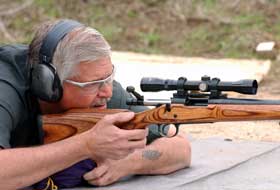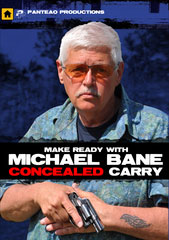I got to thinking about why I really liked the S&W GUNSITE 1911, and I reached some interesting conclusions. I've been lucky enough to shoot literally hundreds of John Browning's great invention over the last three decades. I've shot 1911s from every major manufacturer, original and replica guns from WW1 and WW2, 1910 Commercial copies and the high end stuff from the top makers, in calibers from .22 to .45 Magnum. I've handled the original guns submitted for testing to the military by John Browning, handled and shot Jeff Cooper's personal 1911 carry guns, shot the first "pin guns" built by Jim Clark Senior and the first comp guns from Charles Kelsey, Wilson and Mike Plaxco. At various times I've owned 1911s built/overhauled by Richard Heinie, Bill Wilson, Bill Laughridge, Wayne Novak, Mike LaRocca, Bruce Gray, Ross Carter, Dane Burns, Bob Cogan and several lesser known but excellent 'smiths.; spent time in factories where 1911s were being made; consulted on new 1911s for several companies and blown up two — that was fun!
So what's the difference between a "good" 1911 and an "also ran?" Well, I made a list of sorts:
1) A good 1911 is more than a collection of parts, no matter how good those parts are. I've built 1911s from parts, and, sure, they went bang, but they were far, far, far from world-class handguns!
2) Just because all 1911 parts are "interchangeable" doesn't mean that all of those interchangeable parts work together. The One From Column A; One From Column B approach seldom yields the best gun. I know some really good manufacturers who've gotten stung by this one!
3) Component selection is as much an art as a science. For example, a collection of the "best" parts won't necessarily yield the "best" gun. I've shot guns that, using objective criteria, might qualify as "junk," but that shot as well or better than some of the top end 1911s.
4) The ergonomic relationship between the grip safety and the cut underneath the back of the trigger guard is instrumental in how the gun will feel. The ergonomic relationship between the short or long trigger and the humped or flat mainspring housing will determine how the gun points.
5) Different frame materials have a different subjective feel in handling/transmitting recoil. If you ride a lot of bicycles, you can really feel a difference between steel, titanium, carbon fiber and aluminum frames...one is not necessarily better than the other, but rather it's a different set of compromises for the rider to adjust to. Ditto for 1911 frames. A ploymer-framed STI, an aluminum-framed Colt, a scandium-framed S&W and a steel-framed SIG will all transmit different recoil impulses to the hand.
6) Your hand size determines what set of compromises will feel best to you.
7) Be prepared to change your criteria as you shoot more. I still like razor-sharp checkering, a habit I picked up when I was competing seriously in Florida, where my hands were always slick and sweaty. If you choose sharp checkering, be prepared for a little pain. That thumb safety that looked so cool in the Brownell's catalog might not be nearly so cool once it's on yout gun.
8) Grip safeties are a pain in the butt. I hate them; perversely, one has probably saved my life (a cocked 1911 thrown up in the air by a woman after an accidental shooting, me running toward the inevitable train wreck; the gun landed on the hammer, barrel pointed at the center of my chest...it didn't go bang). My competition guns have pinned grip safeties; my carry guns have grip safeties set so light a thought can disable them. Brother Wayne Novak has a grip safety/mainspring one piece unit that solves the problem.
9) No matter what the experts, pundits, gunwriters and me say, YOU are the final authority on the ergonomics of your 1911. Don't stop 'til you get it right!






6 comments:
One reason the 1911 pistols have remained popular (besides overall function), is the ability to make them personal with whatever additions you want. Owners seem to fall into specific philosophical camps. There are those that will not have anything other than a stock military issue version, those that customize simply because they want the latest and greatest, those that carry and want a no-frills, functional, but better sights than the military version, and shooters, such as competitors, wanting the things that make the gun more shootable.
As you succinctly pointed out, it comes down to personal preferences. For example, whether you like 20 LPI checkering or 30 LPI, or some other LPI depends on the feel and function for you, no one else. I personally find 20 too sharp, with no ability to adjust my grip if desired once I have the gun. 30 LPI, on the other hand, is secure when you grip the gun, but will allow shifting the gun in your hand if you relax the grip slightly. At least for me.
The same goes for other aspects - find what works for you as an individual and don't worry about the rest.
Guy
1911s are the Harley-Davisons of handguns. No one can not change something on them!
Walt Rauch
Nice post as for me. I'd like to read more concerning that theme. Thnx for giving this information.
Joan Stepsen
Buy gadget
Many thanks for developing the effort to discuss this, I feel strongly about this and like studying a great deal more on this subject. If feasible, as you gain expertise, would you mind updating your webpage having a great deal much more info? It is very beneficial for me.
Naples Hotels
You will receive vbghtyfc your prescription Oakley Frogskins in two weeks after you made the order. It is Oakley Frogskin safety for you to make a pair of Cheap Oakley Sunglasses at online Oakley Jawbone store. Enjoy your happiness life with a pair of prescription Oakley Jawbones. Wearing a pair of prescription Oakley sunglasses, your life will be changeable and colorful. There are widely ranges of Oakley sunglasses for you to choose. As we all known that buy a pair of Oakley sunglasses at local Oakley sunglasses store are very expensive.
I totally match with everything you've written.
Post a Comment